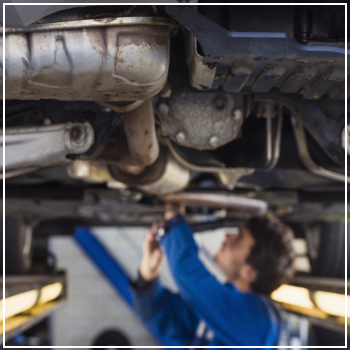Positioned beneath the car, the exhaust system is responsible for channeling harmful gases away from the engine and out of the vehicle. However, it's frequently exposed to road salt and moisture, especially during the colder months. Over time, these elements can lead to rust forming inside and outside the exhaust system, which can compromise its performance and even pose health risks. Rust doesn't happen overnight; it's usually triggered by a combination of factors: Your exhaust system isn't just a series of pipes—it's a complex network designed to protect you and the environment. When rust weakens the system, it can lead to several dangerous outcomes: Firstly, rust can create leaks in the exhaust system, allowing harmful gases like carbon monoxide to enter the cabin. Carbon monoxide is colorless and odorless, making it nearly impossible to detect without a proper monitor. Even small amounts can be dangerous, but significant exposure can lead to symptoms such as headaches, dizziness, and nausea. In severe cases, it can even be fatal. Secondly, a compromised exhaust system means that emissions aren't being properly filtered before they're released into the atmosphere. This contributes to pollution, which harms the environment and violates emissions regulations. Lastly, rust can negatively impact your car's overall performance. A damaged exhaust system forces the engine to work harder, resulting in reduced fuel efficiency and sluggish acceleration. You might notice that your car isn't running as smoothly as it used to, or that you're spending more money on gas than usual. Here are some common warning signs that your exhaust system could be suffering from rust: If you suspect that your exhaust system is rusting, don't wait to address the problem. Left untreated, rust can worsen over time and lead to costly repairs down the line. At DaSilva’s Auto Body, we specialize in diagnosing and fixing exhaust system issues. Whether you need a simple repair or a full replacement, our team is here to help. Don't let rust put your safety—or your wallet—at risk. Schedule an appointment with us today at our Naugatuck location to ensure your exhaust system is functioning as it should. Your peace of mind—and your car—deserve it! SHAOXING KEQIAO FANEVER IMPORT AND EXPORT CO., LTD , https://www.sxfanever.com We often think of rust on a car as just a cosmetic problem, but it can quickly escalate into something much more serious. One part of the car that's particularly vulnerable to rust is the exhaust system, which plays a critical role in managing emissions and ensuring your vehicle runs smoothly.
We often think of rust on a car as just a cosmetic problem, but it can quickly escalate into something much more serious. One part of the car that's particularly vulnerable to rust is the exhaust system, which plays a critical role in managing emissions and ensuring your vehicle runs smoothly.Understanding the Causes of Rust in Your Exhaust System
The Risks of Ignoring Rust in Your Exhaust System
Signs That Your Exhaust System Might Be Rusting
June 08, 2025